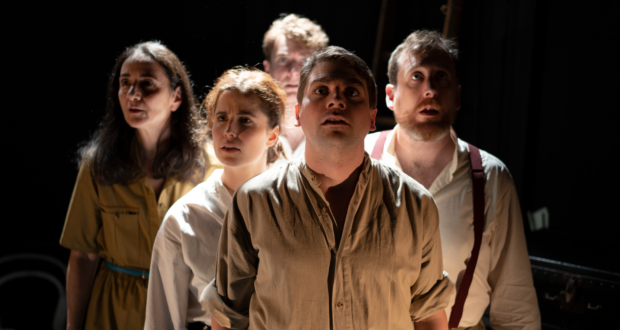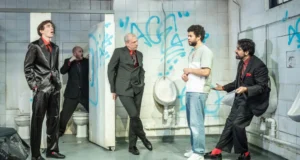Stunningly performed and cleverly created, 12:37 attempts to raise nuanced and controversial questions around Jewish violence and national identity. Deliberately uncomfortable, it draws us into a cross-continent struggle for recognition and safety.Summary
Rating
A haunting rendition of ‘Kol Nidrei’, played through speakers, accompanies the audience as they settle into the studio before the start of 12:37. Traditionally recited in the synagogue before every evening service on Yom Kippur, this instrumental version is led by the cello with a violin & viola accompaniment. The melancholy therein fixes the spectators into the core of this narrative; that of Jewish identity. It also heralds the importance of music throughout both this moving production and the Jewish faith more generally.
The play begins in Dublin with Paul (Alex Cartuson), a Jewish Irishman in his mid-twenties, dancing with the beautiful Eileen (Lisa O’Connor) who is disparagingly referred to by his brother as a shiksa; a non-Jew. He wants to marry her, but his mother (Ruth Lass) won’t let him. Not only is she not Jewish, they are about to move to the east end of London, crippled as they are by debts following his father’s death. And so the performance continues as Paul and his brother Cecil (Eoin O’Dubhghaill) take the spectator from 1935 to 1947, a time frame that encompasses the horror of the Holocaust, through to the struggle against British Imperialism to form a Jewish nation state. They travel from London to Tel Aviv to Jerusalem. In doing so, their battle against antisemitism eventually erupts into an act of terrorism, with horrific consequences for all involved.
This is an important and complex play that attempts to raise nuanced and controversial questions around Jewish violence and national identity. It is deliberately uncomfortable as we watch Cecil, Paul and Rina (a Lithuanian activist, herself a victim of sexual violence during the Holocaust, also played by O’Connor) battle British occupation and everyday antisemitism. Their own multi nation journey reflects the Jewish diaspora and at the culmination of the piece, the inevitably flawed act of terrorism destroys yet more Jews, causing Paul and Rina immense anguish. The family dynamic they portray reinforces the individual at the heart of all violence.
The play’s reach is vast and it has been written specifically for a small cast who each undertake a number of roles. They are all beyond exemplary in their portrayal of their characters. Most scenes are accompanied by one of the characters singing pizmonim in an achingly moving way, the vocal work is exceptional. Scenery is simple but effective. Newspaper-style headlines are held up by each character at the beginning of a scene to reveal the year and place, creating their own black and white snapshot of history.
My concern is that the totality of the ground covered is too vast, whilst clarity is not helped by having actors play more than one character, despite their acting prowess. My own knowledge of the extent or detail of Jewish exclusion, deportation, and antisemitism is inadequate and as a result I missed key points during the narrative. And that’s an opportunity missed. Every point that is made harks back to a Jewish identity, embedded in centuries of deportation, exclusion or annihilation. They are balls of string waiting to be unpicked with endless possibilities of thought. But then the plot moves swiftly on to the next horror and we have lost time for reflection.
There is no doubt that this is sublime and clever writing, but perhaps if less plot were covered, the resulting caesura would enable some real reflection. Nonetheless 12:37 is a stunningly acted and cleverly created piece of theatre.
Written and directed by Julia Pascal
Set and Costume Design by: Liberty Monroe
Lighting Design by: Jon Stacey
Sound Design by: Flick Isaac-Chilton
Produced by: Pascal Theatre Company in association with Neil McPherson for the Finborough Theatre
12:37 plays at Finborough Theatre until 21 December. Further information and bookings can be found here.
 Everything Theatre Reviews, interviews and news for theatre lovers, London and beyond
Everything Theatre Reviews, interviews and news for theatre lovers, London and beyond



